As the state’s budget deadline approaches, Queens democratic lawmakers are at odds over whether it should include a path for legalizing the city’s basement and cellar apartments.
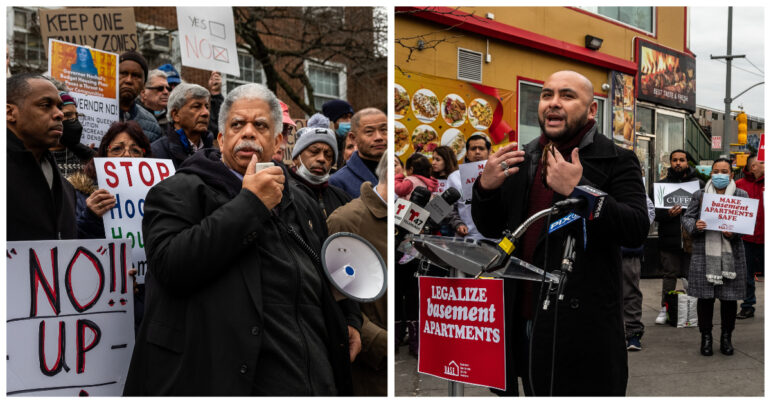
Adi Talwar
At left: Queens State Sen. Leroy Comrie speaking against basement apartment legalization at a rally in Kew Gardens last week. The same day, fellow Queens lawmakers, including Assemblymember Steven Raga (pictured, at right) attended an event in Jackson Heights arguing in favor.Lea la versión en español aquí.
Standing in Diversity Plaza in Jackson Heights one week before the looming state budget deadline, Manhattan Assemblymember Harvey Epstein urged supporters of basement and cellar apartment legalization to call up his disapproving Queens colleagues.
“We all need you. We need you to be here. We need you to push,” Epstein said. “Because Queens is the place that it’s going to happen. And we’re going to get it done here in Queens or it’s not going to get done because of Queens.”
Epstein is co-sponsor, along with Senate Housing Committee Chair Brian Kavanagh of Manhattan, of legislation that would clear the way for New York City to regulate apartments in basements and cellars where New Yorkers already live, often illegally.
Though Gov. Kathy Hochul endorsed a narrower path to legalization in her budget proposal—covering only basements—the Senate and Assembly rejected the whole concept in resolutions that set the stage for final negotiations.
Yet Kavanagh and Epstein are still pressing the issue, having introduced a revised version of their bill they hope will appease critics, including fellow Queens Democrats.
For 15 years, advocates with the Basement Apartments Safe for Everyone (BASE) coalition have argued that regulation will protect thousands of existing basement and cellar tenants from city vacate orders and create uniform safety standards. Fatal flooding during Hurricane Ida brought new urgency—of the six subgrade apartments where people died, four were in Queens.
Because they are unregulated, these apartments are difficult to track. However, a 2021 analysis by the Pratt Center for Community Development in collaboration with BASE estimated that about 30,395 apartments concentrated in eight community districts are not reflected in city building records, including about 9,000 in Queens.*
Claudia, a basement tenant of seven years and mother of five, spoke at the March 24 rally in Jackson Heights. She said that her landlord is retaliating against her for demanding repairs, and that she is fearful of moving into a homeless shelter.
“Most of us who live in the basement are migrants, workers, and they don’t tell us that it is an illegal basement,” she said in Spanish. “We managed to rent a decent room for our children and what happens? [We] demand the right as human beings that we deserve.”
Queens Assemblymember Steve Raga also addressed the crowd, demanding action in the budget. “I grew up in a basement apartment,” he said. “That was the only place that me and my mom could afford for us to live—a basement apartment in Queens.”
But a separate rally that same day in Kew Gardens, a few stops south and east on the F train, demonstrated the entrenched conflict over basement and cellar apartments between Democratic lawmakers in the borough.
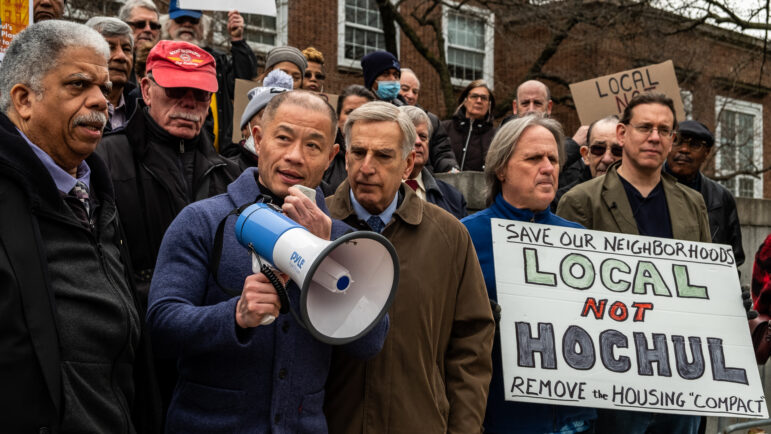
Adi Talwar
Queens State Senators Leroy Comrie and John Liu rallying outside Queens Borough Hall against the governor’s Housing Compact plan, where speakers also took aim at the idea of legalizing basement units.
Senator Leroy Comrie condemned basement legalization outside of Queens Borough Hall, alongside members of the Statewide Alliance Vs. Elimination of 1-Family Zoning in New York, a group organizing against Hochul’s proposed Housing Compact, which would set growth targets across the state.
“There’s no reason for us to legalize something that we know is illegal, that has already caused death, just because people were sold a bill of goods by unfortunate real estate agents that they could rent out their basements—we cannot afford to allow this illegality to continue,” Comrie said.
Southeast Queens resident Michael Scotland told City Limits at the rally that basement apartments could put a strain on street parking and the local sewage system. “From a density perspective, now you’re sort of [turning] a single family home into a two-family home,” he said.
Concerns about denser housing in Eastern Queens came up over and over, as speakers also condemned Hochul’s proposal to allow more residential construction around train stations, and a tax incentive for accessory dwelling units, or small apartments on single-family lots.
“We do not want to have the garages as houses, we don’t want to have houses in our backyards,” said William Scarborough, former Queens assemblymember and now president of the Addisleigh Park Civic Organization. “We did not move into these communities to have 10 units where there’s one house.”
Queens Senator Toby Ann Stavisky was not in attendance, but told City Limits earlier this month that she believes legalization would create “serious problems.”
She also singled out cellars. New York City’s Zoning Resolution and state Multiple Dwelling Law categorize basements as being at least half above curb level, while cellars are at least 50 percent below the curb. “Obviously the cellar is far more dangerous but the basement is also dangerous,” Stavisky said.
The BASE Coalition has argued that basements and cellars can be indistinguishable, and that legalizing the former and not the latter would be needlessly complicated. Mayor Eric Adams’ Administration has also endorsed basement and cellar legalization.
“There are few issues more critical than giving the city the authority to create safe, legal basement and cellar apartments,” said Adams’ Chief Housing Officer Jessica Katz at the pro-legalization rally in Jackson Heights.
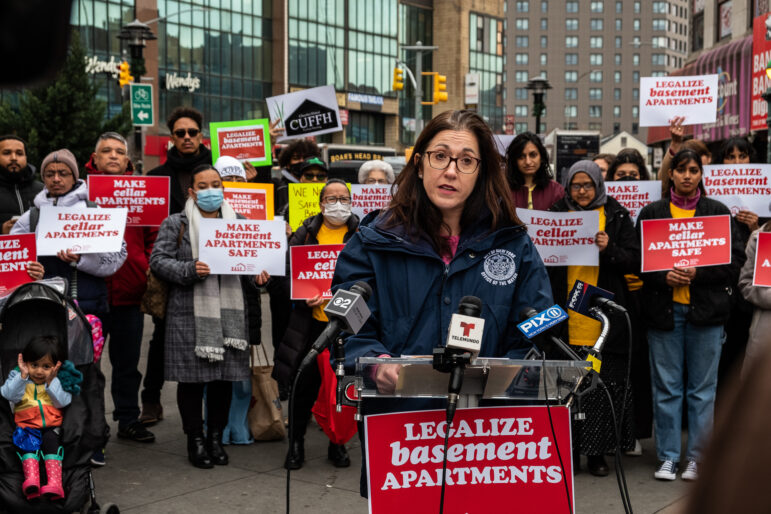
Adi Talwar
Jessica Katz, the city’s chief housing officer, speaking at a March 24 rally in Jackson Heights, calling for the state to pass a plan to legalize basement and cellar units.
The city’s Department of Housing Preservation and Development (HPD) has endorsed Epstein and Kavanagh’s revised bill, which includes more detailed language expanding the agency’s ability to make loans and grants to homeowners.
“With the ability to financially support the kind of work basement and cellar apartments need, we could turn our current unsafe situations into legal and safe apartments,” stated HPD spokesperson William Fowler.
Epstein told City Limits that his revised bill also responds to concerns about waiving the state Multiple Dwelling Law, or MDL, as a prerequisite to city-level regulations. A pilot program in East New York revealed that MDL compliance can push the cost of a conversion toward $1 million, thanks to requirements the city says don’t enhance safety.
“Instead of saying waive the whole Multiple Dwelling Law, we’re saying waive sections of the Multiple Dwelling Law where we’ve had the most problems in the past,” he said.
The BASE Coalition also supports Epstein and Kavanagh’s new bill language, said Sylvia Morse, program manager for policy at the Pratt Center for Community Development.
“We’re confident it will provide relief in most cases, though it’s narrower than what we hoped for,” she said.
The revised bill also calls on the city to establish “protections against eviction and limitations on rent increases,” building on prior language stating that tenants in existing illegal units would have the right to return post-renovation.
“If you’ve got an apartment that’s substandard and illegal, and you’re going to make it legal and put some money into that, you don’t want the result of that to be that they find a tenant who can pay more money,” Kavanagh told City Limits.
Whether a path to basement and cellar legalization will end up in the state budget remains to be seen. Kavanagh noted that it might be viable later in the legislative session, since it doesn’t depend on state funding.
But Epstein said he is focused on a budget breakthrough, fearful that momentum will be lost otherwise. “Post budget, we will have done a lot on housing and people might have some housing fatigue,” he said.
*Editor’s note: This story was updated after publication to clarify the number and type of units estimated by Pratt Center’s 2021 analysis; those figures referred to estimated units unaccounted for in the city record in eight community districts, not citywide basement and cellar units as initially stated.




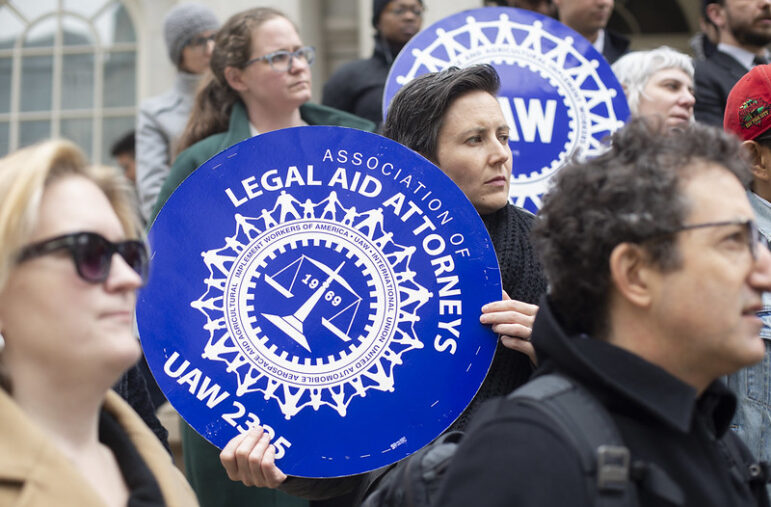
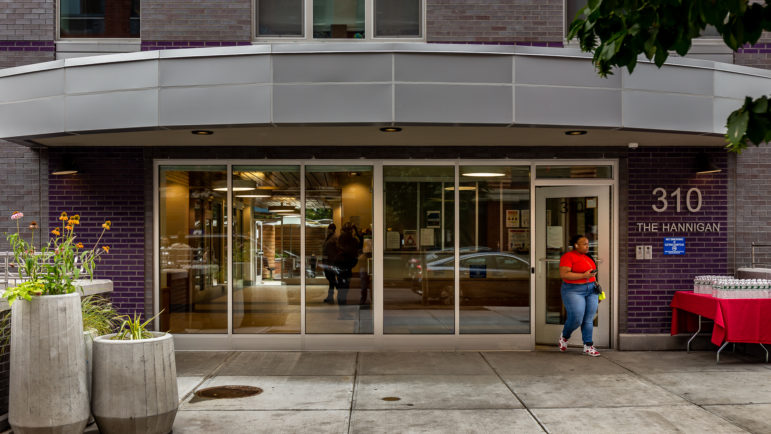



4 thoughts on “Queens is the Battleground in State Budget Fight Over Basement Apartments”
Legalizing basement apartments is a bad idea, legalizing cellars is a worse idea. To do it correctly and safely is massively expensive. Adding basement & cellar apartments will tax the infrastructure of outer borough neighborhoods water and sewer lines.
Since there are thousands of them, why not upgrade them to make sure they are safe for tenants…. at the owner’s expense of course. Or create affordable housing for all New Yorkers…..
There are over 130,000 1-family homes in Queens with cellars (below-grade basements). Cellars are unlivable spaces usually shared with heating and laundry equipment. Horrible idea.
I watched at least one Medical Examiner van take out the bodies of a couple that had died in a cellar fire. Those apartments are literally death traps. We need affordable housing that is not dangerous to life. Cellar apartments by definition cannot be made safe.